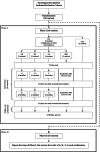Study protocol for 'the effects of multimodal training of cognitive and/or physical functions on cognition and physical fitness of older adults: a cluster randomized controlled trial'
- PMID: 35524188
- PMCID: PMC9073468
- DOI: 10.1186/s12877-022-03031-5
Study protocol for 'the effects of multimodal training of cognitive and/or physical functions on cognition and physical fitness of older adults: a cluster randomized controlled trial'
Abstract
Background: The elderly population worldwide is increasing exponentially which will be associated with more people suffering from cognition and fitness declines. The well-established benefits of exercise training for the elderly's cognitive and physical functioning have been observed. However, the amalgamated effect of combining cognitive and physical exercises on the older adults' cognitive functions, physical fitness, or psycho-related health remains unclear. Thus, this study protocol was planned to conduct different combinations of cognitive and/or physical training interventions to community-dwelling older adults and expected to see the multifaceted effects of the varied combination of training on their health.
Methods: This study is a cluster randomized controlled trial (CRCT). A total of 285 older adults (age ≥ 60) from twenty elderly centres as clusters will be randomly selected and assigned to intervention groups (IGs, n = 16) or control groups (CGs, n = 4). Each IG will be randomly assigned to one of the four combinations of three training modes that include cognitive (A), physical (B), and combined cognitive and physical training (CCPT, i.e. C), namely Mixed ABC, A + B, C + A, B + C. The intervention will last for 4 months in which the training is conducted for 16 sessions, 2 sessions per week, and 60 min per session. Four repeated assessments (pre-test, two post-training tests after 2 months and 4 months, and a follow-up test) will be conducted. The CG will only receive the four repeated assessments but no intervention. The outcome measures include cognitive tests (tests of execution, memory, and psych-social status), physical fitness, and dynamic balance tests.
Discussion: This study will provide substantial evidence that the integrated format of cognitive and physical exercises training will have higher cognition and fitness impact than the single training modes, and all these mixed modalities will have greater positive outcomes than the control condition. If the effectiveness is proven, the intervention can be further explored and extended to the nation so that many more elderly would be benefited.
Trial registration: The trial has been registered in the ClinicalTrials.gov in U.S. NIH (ID: NCT04727450 , date: January 27, 2021).
Keywords: Behavioral and motivation changes; CRCT; Cognitive; Intervention programs; Older adults; Physical training.
© 2022. The Author(s).
Conflict of interest statement
The authors declare that they have no competing interests.
Figures
Similar articles
-
Falls prevention through physical and cognitive training (falls PACT) in older adults with mild cognitive impairment: a randomized controlled trial protocol.BMC Geriatr. 2018 Aug 24;18(1):193. doi: 10.1186/s12877-018-0868-2. BMC Geriatr. 2018. PMID: 30143002 Free PMC article. Clinical Trial.
-
Efficacy and mechanisms of combined aerobic exercise and cognitive training in mild cognitive impairment: study protocol of the ACT trial.Trials. 2018 Dec 22;19(1):700. doi: 10.1186/s13063-018-3054-0. Trials. 2018. PMID: 30577848 Free PMC article.
-
Effects of multidomain versus single-domain training on executive control and memory in older adults: study protocol for a randomized controlled trial.Trials. 2020 May 14;21(1):404. doi: 10.1186/s13063-020-04293-3. Trials. 2020. PMID: 32410715 Free PMC article.
-
The Effects of High-Intensity Functional Training on Cognition in Older Adults with Cognitive Impairment: A Systematic Review.Healthcare (Basel). 2022 Apr 2;10(4):670. doi: 10.3390/healthcare10040670. Healthcare (Basel). 2022. PMID: 35455847 Free PMC article. Review.
-
Does the combination of exercise and cognitive training improve working memory in older adults? A systematic review and meta-analysis.PeerJ. 2023 Apr 10;11:e15108. doi: 10.7717/peerj.15108. eCollection 2023. PeerJ. 2023. PMID: 37065695 Free PMC article.
Cited by
-
A biopsychosocial approach to improving multidimensional frailty status in community-dwelling older adults: a protocol for a cluster randomized controlled trial.BMC Geriatr. 2025 Jul 15;25(1):530. doi: 10.1186/s12877-025-06053-x. BMC Geriatr. 2025. PMID: 40665217 Free PMC article.
-
The Role of Physical Activity in Adjunctive Nursing Management of Neuro-Degenerative Diseases among Older Adults: A Systematic Review of Interventional Studies.Life (Basel). 2024 May 7;14(5):597. doi: 10.3390/life14050597. Life (Basel). 2024. PMID: 38792618 Free PMC article. Review.
References
-
- Hong Kong population projections 2017–2066. p. 5. https://www.statistics.gov.hk/pub/B1120015072017XXXXB0100.pdf. Accessed 26 September 2021.
-
- Dementia: a public health priority. Geneva: World Health Organization; 2012. https://extranet.who.int/agefriendlyworld/wp-content/uploads/2014/06/WHO.... Accessed 26 September 2021.
-
- Loh DA, Hairi NN, Choo WY, MohdHairi F, Peramalah D, Kandiben S, Lee PL, Gani N, Madzlan MF, Abd Hamid MA, et al. MultiComponent Exercise and theRApeutic lifeStyle (CERgAS) intervention to improve physical performance and maintain independent living among urban poor older people–a cluster randomised controlled trial. BMC Geriatr. 2015;15:8. doi: 10.1186/s12877-015-0002-7. - DOI - PMC - PubMed
-
- Sepúlveda-Loyola W, Rodríguez-Sánchez I, Pérez-Rodríguez P, Ganz F, Torralba R, Oliveira DV, Rodríguez-Mañas L. Impact of social isolation due to COVID-19 on health in older people: mental and physical effects and recommendations. J Nutr Health Aging. 2020;24(9):938–947. doi: 10.1007/s12603-020-1500-7. - DOI - PMC - PubMed
Publication types
MeSH terms
Associated data
LinkOut - more resources
Full Text Sources
Medical


